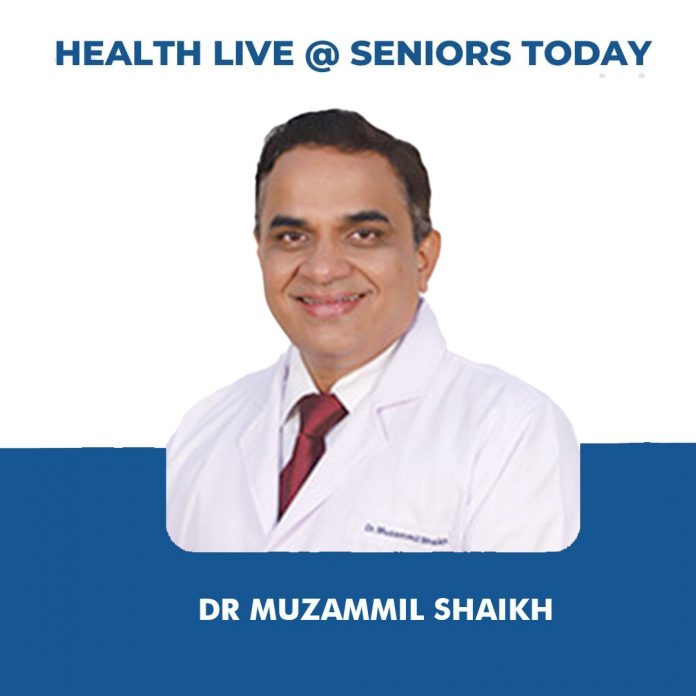On 11 Dec 2022, Health Live @Seniors Today hosted their weekly Health Live webinar with Dr Muzammil Shaikh, Director- Medical Oncology at the Nanavati Max Super Speciality Hospital, Mumbai. He spoke and answered questions about cancer detection and care in senior citizens.
About Dr Muzammil Shaikh:
Dr Muzammil Shaikh is Director, Medical Oncology at the Nanavati Max Super Speciality Hospital, Mumbai. A graduate from the Grant Medical College & Sir JJ Hospital of the University of Mumbai, he did an MD in Internal Medicine from the Seth GS Medical College & KEM Hospital, and later a DM in Medical Oncology from the The Gujarat Cancer & Research Institute. He did a DNB in Medical Oncology from the National Board, New Delhi.
With over two decades experience, Dr Shaikh has been Consultant Medical Oncologist at the Hinduja Hospital from April 2013. In May 2013, he did an Observership in MD Anderson Cancer Centre, Houston USA, and before that he has been associated with the Hinduja Hospital for many years.
He is a member of the Indian Cooperative Oncology Network, Indian Musculoskeletal Oncology Study Group, the European Society of Medical Oncology, the Mumbai Hematology Group and the Indian Medical Association.
Cancer has increased in incidence over the past few years. Which is why it is important to know and recognise the early signs and symptoms so we can report early and intervene on time.
There are multiple factors that play a role in varied kinds of cancers.
It is usually multifactorial.
Many of the cancers, approximately 30-40% cancers are man made. And if we do not take the necessary actions, the numbers will continue to stay on the rise. These include consumption of tobacco, in any form, following a westernised lifestyle which includes- sedentary lifestyle, consumption of large amounts of processed food items.
There are also factors which are beyond our control, such as the ageing process- as the average age of an Indian has increased from 40 to 68, the probability of developing cancer due to ageing of the cells and reduced immunity with age.
The facility for cancer patients has definitely increased over the years. With an increase in the number of specialists in the department of oncology, better technology for early detection and intervention, rise in the number of institutes and hospitals providing specialised care to cancer patients. However specific, specialised and sophisticated treatments such as immunotherapy are still not easily available at all cancer institutes.
Out of all the cancers that are seen, only 10-20% have a genetic linkage. 90% of the time there is no family history. The relevance of cancer in the family is also of importance.
If there are members who have developed breast cancer over the age of 50, it is likely that the cause was not genetic. If the mother/ any other member of the family developed breast cancer below the age of 50, the chances are that it could be genetic and can be passed down to the next generation. Such individuals can get their genetic testing done and the daughters of the affected mothers can get a mammogram every 2 years after the age of 50 – this is a routine recommendation for other individuals as well.




Comments are closed.